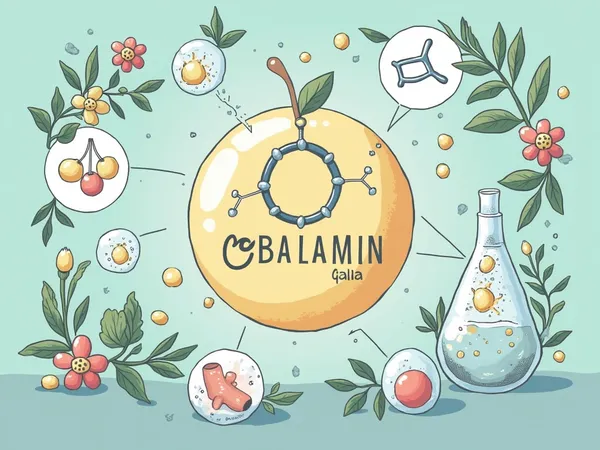
Ready to Start Your Wellness Journey?
Become a Herbalife Preferred Member and enjoy exclusive discounts of up to 25% on all products.
BECOME A PREFERRED MEMBERCobalamin: Essential Nutrient for Brain and Body Health
Disclaimer: This article is for informational purposes only and should not be considered medical advice. Always consult a healthcare professional or a registered dietitian before making significant changes to your diet or starting any supplementation.
Introduction
Cobalamin, commonly known as vitamin B12, is a water-soluble vitamin that plays essential roles in several physiological processes. It supports healthy red blood cell formation, maintains neurological function, and is required for DNA synthesis. Because the human body cannot synthesize cobalamin in sufficient amounts, it must be obtained from dietary sources or supplements. Understanding its functions, sources, and the consequences of deficiency can help individuals make informed choices to maintain adequate levels of this vital nutrient.
Role in the Body
Specific Functions
Cobalamin serves as a cofactor for two enzyme systems:
• Methylmalonyl-CoA Mutase: Converts methylmalonyl-CoA to succinyl-CoA, a step in the metabolism of certain amino acids and fatty acids.
• Methionine Synthase: Catalyzes the remethylation of homocysteine to methionine, important for DNA synthesis and methylation reactions.
Key physiological roles include:
• Red Blood Cell Formation: Supports DNA synthesis in bone marrow to prevent megaloblastic anemia.
• Neurological Health: Contributes to maintenance of the myelin sheath that insulates nerve fibers, supporting nerve impulse transmission.
Effects of Deficiency
Insufficient cobalamin can lead to:
• Megaloblastic Anemia: Enlarged, dysfunctional red blood cells causing fatigue, weakness, and pallor.
• Neurological Symptoms: Numbness or tingling in extremities, balance difficulties, memory issues, and mood changes; prolonged deficiency may cause irreversible nerve damage.
• Elevated Homocysteine: Impaired remethylation may raise homocysteine levels, a biomarker linked to cardiovascular risk.
• Glossitis and Gastrointestinal Distress: Inflammation of the tongue, mouth ulcers, nausea, and diarrhea.
Populations at higher risk include older adults, individuals with pernicious anemia, those with gastrointestinal malabsorption (e.g., post-bariatric surgery), strict vegetarians or vegans, and people on long-term proton pump inhibitors or metformin.
Dietary Sources
Best Food Sources
Natural sources of cobalamin are mainly animal-based. Typical amounts per serving:
• Beef liver (85 g) – ~70.7 µg, >1000% Daily Value (DV)
• Clams (85 g) – ~84.1 µg, ~1400% DV
• Trout (85 g) – ~5.4 µg, ~90% DV
• Salmon (85 g) – ~4.9 µg, ~80% DV
• Fortified breakfast cereal (1 serving) – 6 µg, 100% DV
• Grass-fed beef (85 g) – 1.4 µg, ~25% DV
• Swiss cheese (28 g) – 0.9 µg, ~15% DV
Supplementation
Supplementation may be necessary for:
• Vegan and Vegetarian Diets: Fortified foods or supplements help meet B12 requirements.
• Pernicious Anemia: Intrinsic factor deficiency often managed with intramuscular injections.
• Gastrointestinal Disorders: Conditions like celiac disease, Crohn’s disease, or gastric bypass may require high-dose oral or injectable B12.
• Medications: Long-term acid-reducing drugs or metformin can impair absorption.
Common supplement forms include cyanocobalamin and methylcobalamin. Oral doses of 500–2000 µg daily are often used for individuals with low intake or mild malabsorption. Injection protocols depend on deficiency severity and clinical guidelines.
Health Benefits
Adequate cobalamin intake supports:
• Energy Metabolism: Normal B12 status is required for cellular energy production; deficiency can manifest as fatigue.
• Mood and Cognitive Function: Low B12 levels have been associated with mood disturbances in some studies, and maintaining adequate status supports neurological health.
• Homocysteine Regulation: B12 contributes to homocysteine remethylation; maintaining normal levels is part of cardiovascular health monitoring.
• Fetal Development: Maternal B12 sufficiency is important for neural development, and deficiency has been associated with increased risk of neural tube defects in some research.
Daily Requirements
The National Institutes of Health provides these Recommended Dietary Allowances (RDAs):
• Infants 0–6 months: 0.4 µg
• Infants 7–12 months: 0.5 µg
• Children 1–3 years: 0.9 µg
• Children 4–8 years: 1.2 µg
• Children 9–13 years: 1.8 µg
• Adolescents 14–18 years: 2.4 µg
• Adults ≥19 years: 2.4 µg
• Pregnancy: 2.6 µg
• Lactation: 2.8 µg
No Tolerable Upper Intake Level (UL) has been set due to low toxicity risk from high oral or injected doses. Individual needs may vary based on health status and absorption.
Tips for Incorporation
Practical strategies to support cobalamin intake:
• Include at least two servings of B12-rich animal products per day, such as dairy, eggs, fish, or meat.
• Choose fortified plant-based milk, breakfast cereals, or nutritional yeast if you follow a vegetarian or vegan diet.
• Cook foods gently—excessive heat can reduce vitamin B12 content, so steaming or pan-frying at moderate temperatures is preferable.
• Consider sublingual or chewable B12 supplements for individuals with mild absorption issues.
• For older adults or those on long-term acid-reducing medications, have B12 status monitored regularly.
Conclusion and Call to Action
Cobalamin (vitamin B12) is essential for red blood cell production, neurological function, and DNA synthesis. Ensuring adequate intake through diet or supplementation can prevent deficiency-related disorders. Review your dietary habits, consult with a healthcare professional, and incorporate B12-rich foods or supplements as needed to support overall health.
Ready to Start Your Wellness Journey?
Become a Herbalife Preferred Member and enjoy exclusive discounts of up to 25% on all products.
BECOME A PREFERRED MEMBER